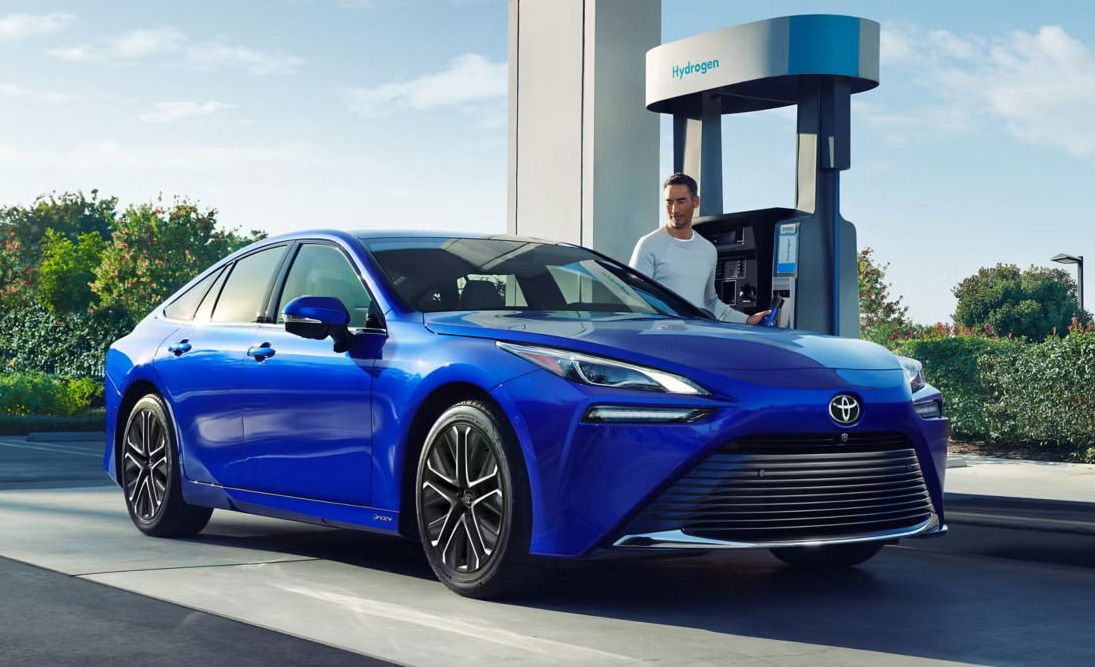Toyota is facing severe allegations surrounding its hydrogen fuel cell car, the Mirai. Once heralded as a groundbreaking vehicle poised to set new standards for green transportation, the Mirai is now at the center of controversy due to numerous reported issues and accusations against Toyota’s business practices.
Carmen, a Mirai owner, struggles with persistent leaks in her vehicle, often resorting to using towels to manage the problem. She also faces frequent difficulties detaching the hydrogen nozzle from her car and has been stranded multiple times at unreliable hydrogen fueling stations. These issues raise significant safety concerns for drivers like Carmen, who are left vulnerable on the road.
Maria, another Mirai owner, walked into Longo Toyota intending to upgrade her Camry. Instead, she was persuaded to purchase a Mirai for $35,000. Shortly after, her new vehicle began emitting high-pitched noises that Toyota could not fix. Compounding her frustrations, her free hydrogen fuel card was inexplicably canceled, leaving her with a $766 monthly payment for a car that she describes as malfunctioning and unreliable.
Toyota claims the Mirai can drive 400 miles on a single tank of hydrogen, but drivers report an average range closer to 200 miles. The discrepancy between the advertised and actual performance has led to growing dissatisfaction among consumers.

Furthermore, while Toyota markets the Mirai as an environmentally friendly vehicle, critics argue that the company has not been transparent about the environmental impact of its hydrogen production processes. Concerns are mounting that the overall carbon footprint of the Mirai may be more significant than Toyota admits.
The poor state of hydrogen fueling infrastructure exacerbates these problems. Many stations are non-functional, and drivers often find themselves waiting for hours as pumps malfunction or get stuck. Additionally, Toyota has been accused of leveraging its market dominance to block rival hydrogen fuel companies from entering the market.
Allegedly, Toyota has gifted free Mirais to California politicians to gain influence, allowing the company to control hydrogen infrastructure and secure taxpayer-funded grants that stifle competition and limit consumer choices.
A recent class action lawsuit filed against Toyota in the United States District Court for the Central District of California sheds light on these issues. The lawsuit, led by attorney Jason Ingber of The Ingber Law Group, represents numerous Mirai owners who claim they were misled by Toyota’s false advertising and deceptive practices.
The lawsuit accuses Toyota of monopolizing the hydrogen fuel market, particularly in California, where it has sold over 14,000 Mirais. The plaintiffs argue that Toyota maintained its dominance through anti-competitive behavior, including the manipulation of hydrogen fueling standards and the suppression of alternative hydrogen stations.
The lawsuit also details how Toyota imposed a retroactive fueling standard, SAEJ260, that was impossible for many existing stations to meet. This standard, according to the plaintiffs, was weaponized by Toyota to eliminate competition.
The case of California State University, Los Angeles, is highlighted, where the university spent millions in taxpayer dollars to build a hydrogen fueling station that Toyota refused to approve for years, despite it meeting all other regulatory requirements.
Additionally, the lawsuit accuses Toyota of exploiting taxpayer funds by lobbying aggressively for state grants and subsidies while blocking the entry of cleaner hydrogen technologies into the market.
Toyota is alleged to have chosen to produce hydrogen using carbon-based methods, despite promises to transition to greener alternatives. This choice, the plaintiffs argue, betrays the trust of California taxpayers who funded these initiatives with the expectation of supporting environmentally friendly technologies.
The lawsuit further claims that Toyota misled consumers by marketing the Mirai as a zero-emission vehicle while concealing the environmental costs associated with its hydrogen production methods. Mirai owners were allegedly coerced into fueling at Toyota-approved stations through restrictive fuel cards, limiting their options and contributing to the vehicle's depreciation.
The broader impact of Toyota’s actions is significant. The lawsuit seeks not only to compensate affected consumers but also to address the environmental damage and market distortions caused by Toyota’s practices. The plaintiffs are calling for treble damages, punitive damages, and an injunction to prevent Toyota from continuing its allegedly illegal practices.
They also demand that Toyota return all taxpayer funds received under false pretenses.
Attorney Jason Ingber, representing the plaintiffs, is determined to hold Toyota accountable for its alleged misconduct. Ingber's legal battle is not just about securing compensation for Mirai owners but also about pushing for necessary changes in Toyota’s business practices to ensure transparency, fairness, and competition in the hydrogen fuel market.
For more information, visit https://jasoningber.com/toyotamirai/
About the Author:

Jason Ingber is an accomplished trial lawyer with a strong track record in various legal areas. A UCLA School of Law graduate, Jason has defended multi-billion dollar corporations and worked with international law firms and elite talent agencies. Now, he uses his extensive experience to advocate for individuals and smaller entities, making him a formidable advocate in the pursuit of justice.